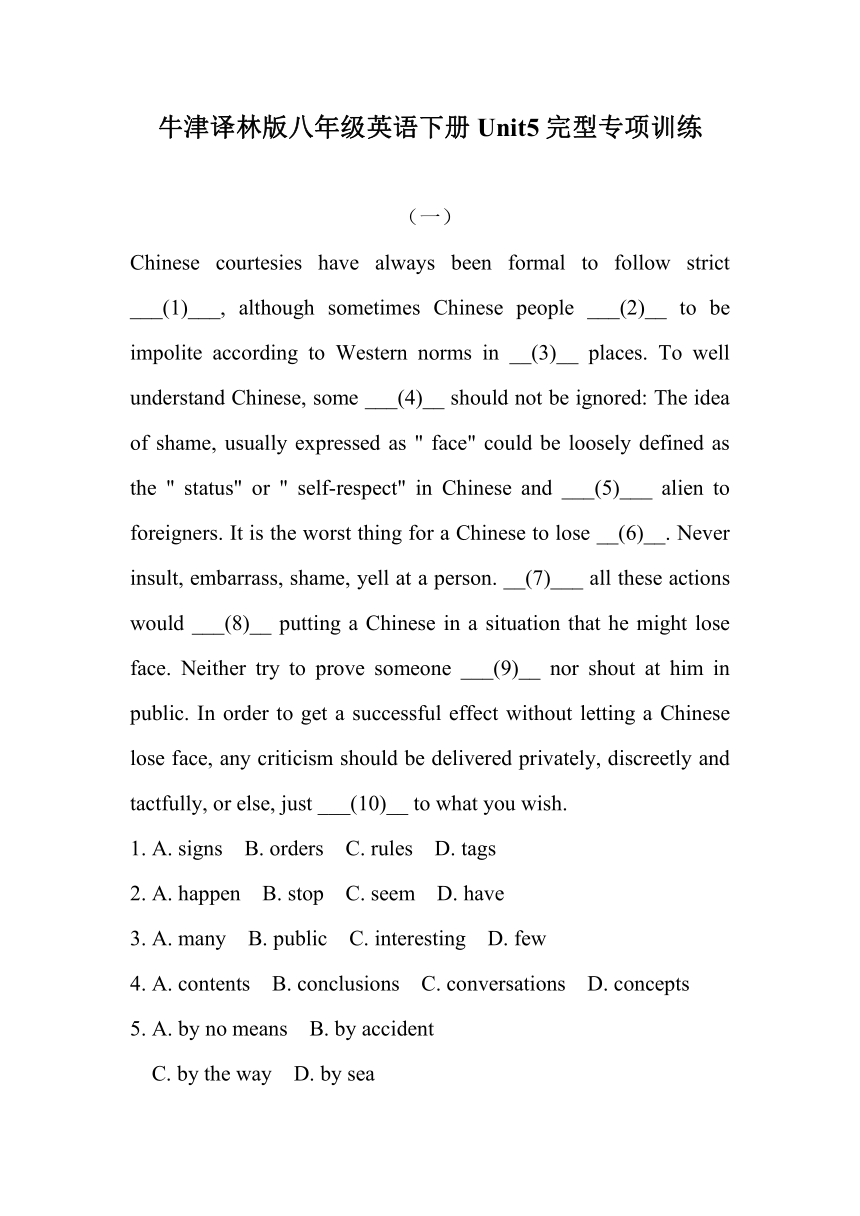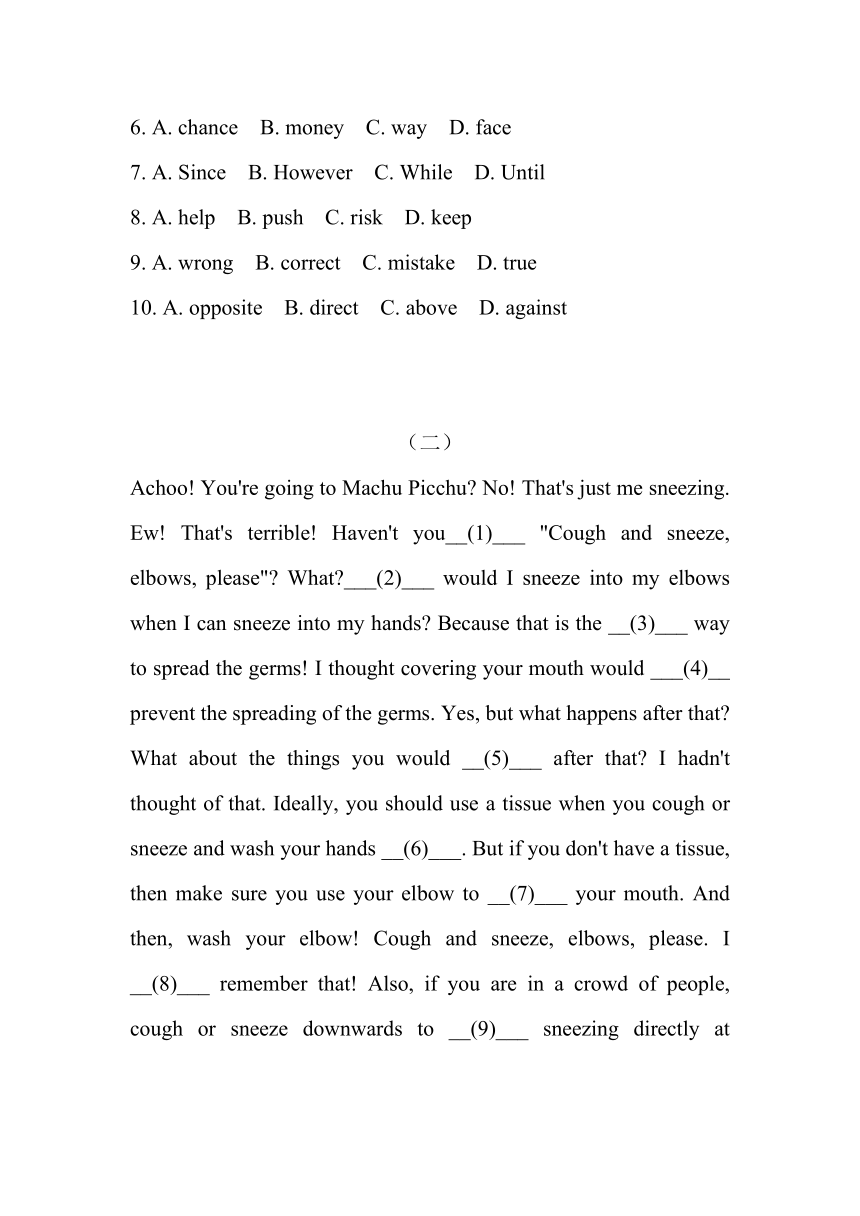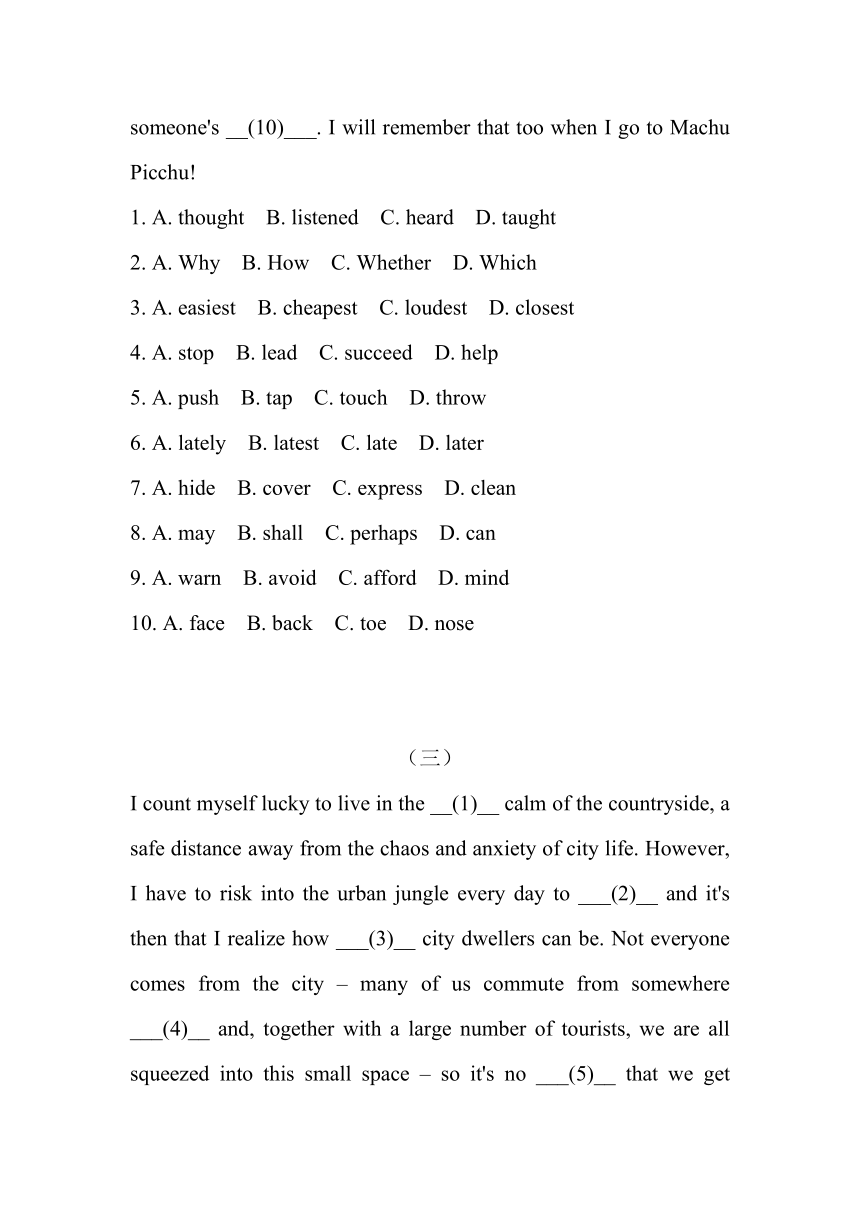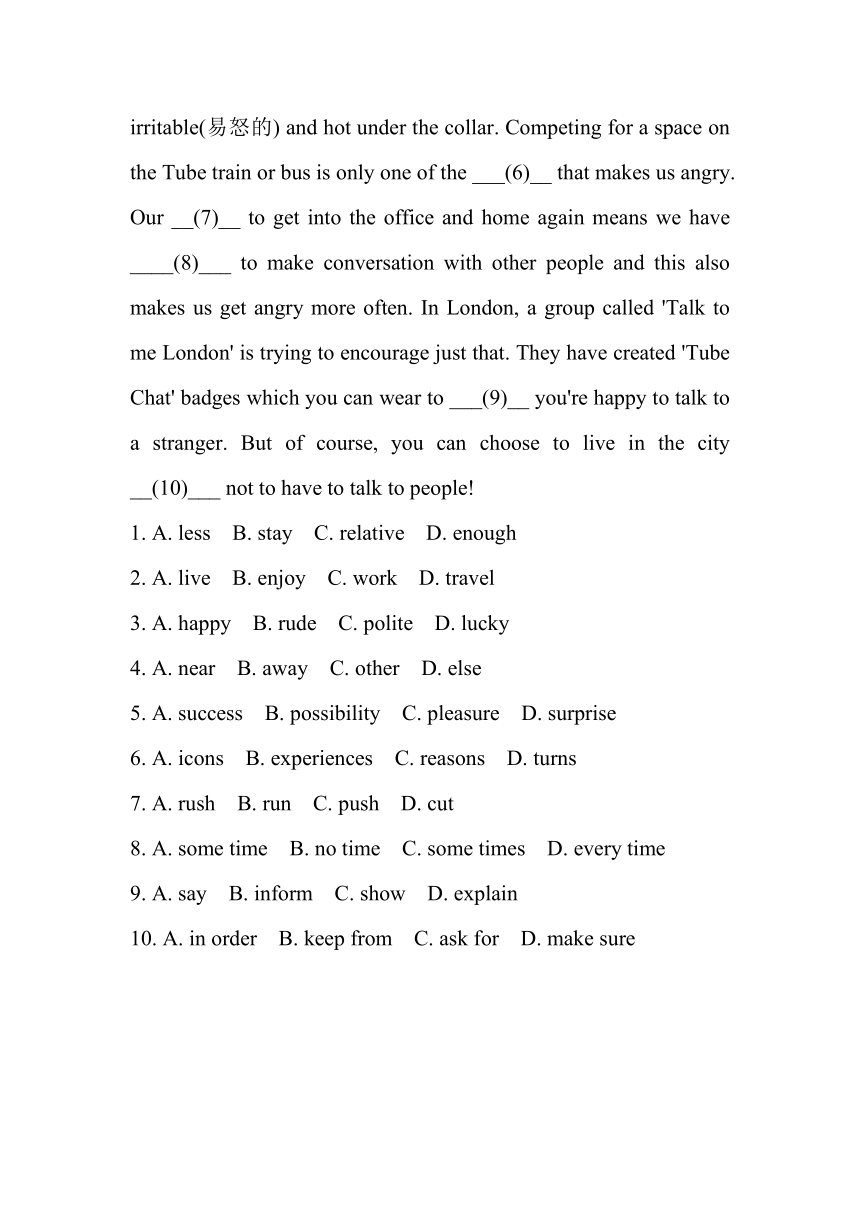Unit 5 Good manners 完型专项训练(含答案)
文档属性
| 名称 | Unit 5 Good manners 完型专项训练(含答案) |  | |
| 格式 | docx | ||
| 文件大小 | 26.8KB | ||
| 资源类型 | 教案 | ||
| 版本资源 | 牛津译林版 | ||
| 科目 | 英语 | ||
| 更新时间 | 2021-05-28 10:53:45 | ||
图片预览




文档简介
牛津译林版八年级英语下册Unit5完型专项训练
(一)
Chinese courtesies have always been formal to follow strict ___(1)___, although sometimes Chinese people ___(2)__ to be impolite according to Western norms in __(3)__ places. To well understand Chinese, some ___(4)__ should not be ignored: The idea of shame, usually expressed as " face" could be loosely defined as the " status" or " self-respect" in Chinese and ___(5)___ alien to foreigners. It is the worst thing for a Chinese to lose __(6)__. Never insult, embarrass, shame, yell at a person. __(7)___ all these actions would ___(8)__ putting a Chinese in a situation that he might lose face. Neither try to prove someone ___(9)__ nor shout at him in public. In order to get a successful effect without letting a Chinese lose face, any criticism should be delivered privately, discreetly and tactfully, or else, just ___(10)__ to what you wish.
1. A. signs B. orders C. rules D. tags
2. A. happen B. stop C. seem D. have
3. A. many B. public C. interesting D. few
4. A. contents B. conclusions C. conversations D. concepts
5. A. by no means B. by accident
C. by the way D. by sea
6. A. chance B. money C. way D. face
7. A. Since B. However C. While D. Until
8. A. help B. push C. risk D. keep
9. A. wrong B. correct C. mistake D. true
10. A. opposite B. direct C. above D. against
(二)
Achoo! You're going to Machu Picchu? No! That's just me sneezing. Ew! That's terrible! Haven't you__(1)___ "Cough and sneeze, elbows, please"? What?___(2)___ would I sneeze into my elbows when I can sneeze into my hands? Because that is the __(3)___ way to spread the germs! I thought covering your mouth would ___(4)__ prevent the spreading of the germs. Yes, but what happens after that? What about the things you would __(5)___ after that? I hadn't thought of that. Ideally, you should use a tissue when you cough or sneeze and wash your hands __(6)___. But if you don't have a tissue, then make sure you use your elbow to __(7)___ your mouth. And then, wash your elbow! Cough and sneeze, elbows, please. I __(8)___ remember that! Also, if you are in a crowd of people, cough or sneeze downwards to __(9)___ sneezing directly at someone's __(10)___. I will remember that too when I go to Machu Picchu!
1. A. thought B. listened C. heard D. taught
2. A. Why B. How C. Whether D. Which
3. A. easiest B. cheapest C. loudest D. closest
4. A. stop B. lead C. succeed D. help
5. A. push B. tap C. touch D. throw
6. A. lately B. latest C. late D. later
7. A. hide B. cover C. express D. clean
8. A. may B. shall C. perhaps D. can
9. A. warn B. avoid C. afford D. mind
10. A. face B. back C. toe D. nose
(三)
I count myself lucky to live in the __(1)__ calm of the countryside, a safe distance away from the chaos and anxiety of city life. However, I have to risk into the urban jungle every day to ___(2)__ and it's then that I realize how ___(3)__ city dwellers can be. Not everyone comes from the city – many of us commute from somewhere ___(4)__ and, together with a large number of tourists, we are all squeezed into this small space – so it's no ___(5)__ that we get irritable(易怒的) and hot under the collar. Competing for a space on the Tube train or bus is only one of the ___(6)__ that makes us angry. Our __(7)__ to get into the office and home again means we have ____(8)___ to make conversation with other people and this also makes us get angry more often. In London, a group called 'Talk to me London' is trying to encourage just that. They have created 'Tube Chat' badges which you can wear to ___(9)__ you're happy to talk to a stranger. But of course, you can choose to live in the city __(10)___ not to have to talk to people!
1. A. less B. stay C. relative D. enough
2. A. live B. enjoy C. work D. travel
3. A. happy B. rude C. polite D. lucky
4. A. near B. away C. other D. else
5. A. success B. possibility C. pleasure D. surprise
6. A. icons B. experiences C. reasons D. turns
7. A. rush B. run C. push D. cut
8. A. some time B. no time C. some times D. every time
9. A. say B. inform C. show D. explain
10. A. in order B. keep from C. ask for D. make sure
(四)
Household trash has occupied the minds of Shanghai residents this week: specifically, are the ___(1)__ of their bins "wet", "dry", "hazardous" or "recyclable"? Residents of the city, one of the world's ___(2)__ with about 23 million people, must __(3)___ their trash according to those labels under a mandatory(强制的) sorting scheme starting on July 1.
Huang Rong, secretary general of the Shanghai government, said on Friday more than 70% of residential districts should totally follow the new trash sorting rules __(4)___ next year. Though Shanghai has hired 1,700 instructors and conducted 13,000 __(5)__ sessions, confused residents on social media are demanding to know __(6)__ to sort items like batteries, human hair, meat on a bone, or fruit seeds and skins. The government has ___(7)__ an app to handle these enquiries(查询). Shanghai aims to eventually burn or recycle all waste.
China is building hundreds of "waste to energy" __(8)___ that use garbage to generate power. Huang said the new sorting measures were __(9)___ the beginning, and would not instantly solve Shanghai's garbage challenges. "We need to step up the propaganda(宣传), and the construction of infrastructure and make sure that the separation of trash will ___(10)__ our requirements(要求).
1. A. contents B. subjects C. tasks D. meanings
2. A. greatest B. biggest C. furthest D. closest
3. A. manage B. copy C. sell D. arrange
4. A. in B. at C. by D. on
5. A. training B. warning C. missing D. developing
6. A. what B. how C. where D. when
7. A. look up B. go up C. set up D. turn up
8. A. products B. plants C. pools D. purposes
9. A. once B. indeed C. really D. just
10. A. finish B. above C. explain D. meet
(五)
How bad is New York's trash nightmare? So bad that, back in 2013, officials __(1)___ their best to control the growing rat population. Raised on New Yorkers' __(2)___ and putrefying(腐烂的) leavings, the rats knew they had ___(3)___ options available to them. For the most part, residential garbage collection is quite __(4)___. It's ___(5)___ by a public regulated city agency with rules to protect workers and pedestrians. The big problem is the trash from businesses, which is handled by the __(6)___ garbage industry. Commercial sanitation is like the Wild West, at least if you can ___(7)___ the Wild West as a fetid(恶臭的) dump. Unlike many major cities, New York has no extensive system of alleyways(小巷). New Yorkers throw bags of banana peels and coffee grounds and meat scraps ___(8)___ in front of their businesses. Garbage trucks from an estimated 90 companies weave __(9)___ the whole city every day, according to a report from the city’s first __(10)___ in 2016 .
1. A. worked B. built C. tried D. attempted
2. A. rich B. fallen C. delicious D. colourful
3. A. much more B. many more C. more than D. less than
4. A. efficient B. patient C. different D. silent
5. A. overdressed B. overspent C. overcame D. overseen
6. A. private B. open C. top D. expensive
7. A. think B. believe C. imagine D. trust
8. A. quickly B. directly C. quietly D. politely
9. A. down B. through C. across D. away
10. A. created B. practised C. published D. discussed
答 案
(一)
1-5 CCBDA 6-10 DACAA
(二)
1-5 CAADC 6-10 DBBBA
(三)
1-5 CCBDD 6-10 CABCA
(四)
1-5 ABDCA 6-10 BCBDD
(五)
1-5 CABAD 6-10 ACBBC
(一)
Chinese courtesies have always been formal to follow strict ___(1)___, although sometimes Chinese people ___(2)__ to be impolite according to Western norms in __(3)__ places. To well understand Chinese, some ___(4)__ should not be ignored: The idea of shame, usually expressed as " face" could be loosely defined as the " status" or " self-respect" in Chinese and ___(5)___ alien to foreigners. It is the worst thing for a Chinese to lose __(6)__. Never insult, embarrass, shame, yell at a person. __(7)___ all these actions would ___(8)__ putting a Chinese in a situation that he might lose face. Neither try to prove someone ___(9)__ nor shout at him in public. In order to get a successful effect without letting a Chinese lose face, any criticism should be delivered privately, discreetly and tactfully, or else, just ___(10)__ to what you wish.
1. A. signs B. orders C. rules D. tags
2. A. happen B. stop C. seem D. have
3. A. many B. public C. interesting D. few
4. A. contents B. conclusions C. conversations D. concepts
5. A. by no means B. by accident
C. by the way D. by sea
6. A. chance B. money C. way D. face
7. A. Since B. However C. While D. Until
8. A. help B. push C. risk D. keep
9. A. wrong B. correct C. mistake D. true
10. A. opposite B. direct C. above D. against
(二)
Achoo! You're going to Machu Picchu? No! That's just me sneezing. Ew! That's terrible! Haven't you__(1)___ "Cough and sneeze, elbows, please"? What?___(2)___ would I sneeze into my elbows when I can sneeze into my hands? Because that is the __(3)___ way to spread the germs! I thought covering your mouth would ___(4)__ prevent the spreading of the germs. Yes, but what happens after that? What about the things you would __(5)___ after that? I hadn't thought of that. Ideally, you should use a tissue when you cough or sneeze and wash your hands __(6)___. But if you don't have a tissue, then make sure you use your elbow to __(7)___ your mouth. And then, wash your elbow! Cough and sneeze, elbows, please. I __(8)___ remember that! Also, if you are in a crowd of people, cough or sneeze downwards to __(9)___ sneezing directly at someone's __(10)___. I will remember that too when I go to Machu Picchu!
1. A. thought B. listened C. heard D. taught
2. A. Why B. How C. Whether D. Which
3. A. easiest B. cheapest C. loudest D. closest
4. A. stop B. lead C. succeed D. help
5. A. push B. tap C. touch D. throw
6. A. lately B. latest C. late D. later
7. A. hide B. cover C. express D. clean
8. A. may B. shall C. perhaps D. can
9. A. warn B. avoid C. afford D. mind
10. A. face B. back C. toe D. nose
(三)
I count myself lucky to live in the __(1)__ calm of the countryside, a safe distance away from the chaos and anxiety of city life. However, I have to risk into the urban jungle every day to ___(2)__ and it's then that I realize how ___(3)__ city dwellers can be. Not everyone comes from the city – many of us commute from somewhere ___(4)__ and, together with a large number of tourists, we are all squeezed into this small space – so it's no ___(5)__ that we get irritable(易怒的) and hot under the collar. Competing for a space on the Tube train or bus is only one of the ___(6)__ that makes us angry. Our __(7)__ to get into the office and home again means we have ____(8)___ to make conversation with other people and this also makes us get angry more often. In London, a group called 'Talk to me London' is trying to encourage just that. They have created 'Tube Chat' badges which you can wear to ___(9)__ you're happy to talk to a stranger. But of course, you can choose to live in the city __(10)___ not to have to talk to people!
1. A. less B. stay C. relative D. enough
2. A. live B. enjoy C. work D. travel
3. A. happy B. rude C. polite D. lucky
4. A. near B. away C. other D. else
5. A. success B. possibility C. pleasure D. surprise
6. A. icons B. experiences C. reasons D. turns
7. A. rush B. run C. push D. cut
8. A. some time B. no time C. some times D. every time
9. A. say B. inform C. show D. explain
10. A. in order B. keep from C. ask for D. make sure
(四)
Household trash has occupied the minds of Shanghai residents this week: specifically, are the ___(1)__ of their bins "wet", "dry", "hazardous" or "recyclable"? Residents of the city, one of the world's ___(2)__ with about 23 million people, must __(3)___ their trash according to those labels under a mandatory(强制的) sorting scheme starting on July 1.
Huang Rong, secretary general of the Shanghai government, said on Friday more than 70% of residential districts should totally follow the new trash sorting rules __(4)___ next year. Though Shanghai has hired 1,700 instructors and conducted 13,000 __(5)__ sessions, confused residents on social media are demanding to know __(6)__ to sort items like batteries, human hair, meat on a bone, or fruit seeds and skins. The government has ___(7)__ an app to handle these enquiries(查询). Shanghai aims to eventually burn or recycle all waste.
China is building hundreds of "waste to energy" __(8)___ that use garbage to generate power. Huang said the new sorting measures were __(9)___ the beginning, and would not instantly solve Shanghai's garbage challenges. "We need to step up the propaganda(宣传), and the construction of infrastructure and make sure that the separation of trash will ___(10)__ our requirements(要求).
1. A. contents B. subjects C. tasks D. meanings
2. A. greatest B. biggest C. furthest D. closest
3. A. manage B. copy C. sell D. arrange
4. A. in B. at C. by D. on
5. A. training B. warning C. missing D. developing
6. A. what B. how C. where D. when
7. A. look up B. go up C. set up D. turn up
8. A. products B. plants C. pools D. purposes
9. A. once B. indeed C. really D. just
10. A. finish B. above C. explain D. meet
(五)
How bad is New York's trash nightmare? So bad that, back in 2013, officials __(1)___ their best to control the growing rat population. Raised on New Yorkers' __(2)___ and putrefying(腐烂的) leavings, the rats knew they had ___(3)___ options available to them. For the most part, residential garbage collection is quite __(4)___. It's ___(5)___ by a public regulated city agency with rules to protect workers and pedestrians. The big problem is the trash from businesses, which is handled by the __(6)___ garbage industry. Commercial sanitation is like the Wild West, at least if you can ___(7)___ the Wild West as a fetid(恶臭的) dump. Unlike many major cities, New York has no extensive system of alleyways(小巷). New Yorkers throw bags of banana peels and coffee grounds and meat scraps ___(8)___ in front of their businesses. Garbage trucks from an estimated 90 companies weave __(9)___ the whole city every day, according to a report from the city’s first __(10)___ in 2016 .
1. A. worked B. built C. tried D. attempted
2. A. rich B. fallen C. delicious D. colourful
3. A. much more B. many more C. more than D. less than
4. A. efficient B. patient C. different D. silent
5. A. overdressed B. overspent C. overcame D. overseen
6. A. private B. open C. top D. expensive
7. A. think B. believe C. imagine D. trust
8. A. quickly B. directly C. quietly D. politely
9. A. down B. through C. across D. away
10. A. created B. practised C. published D. discussed
答 案
(一)
1-5 CCBDA 6-10 DACAA
(二)
1-5 CAADC 6-10 DBBBA
(三)
1-5 CCBDD 6-10 CABCA
(四)
1-5 ABDCA 6-10 BCBDD
(五)
1-5 CABAD 6-10 ACBBC
